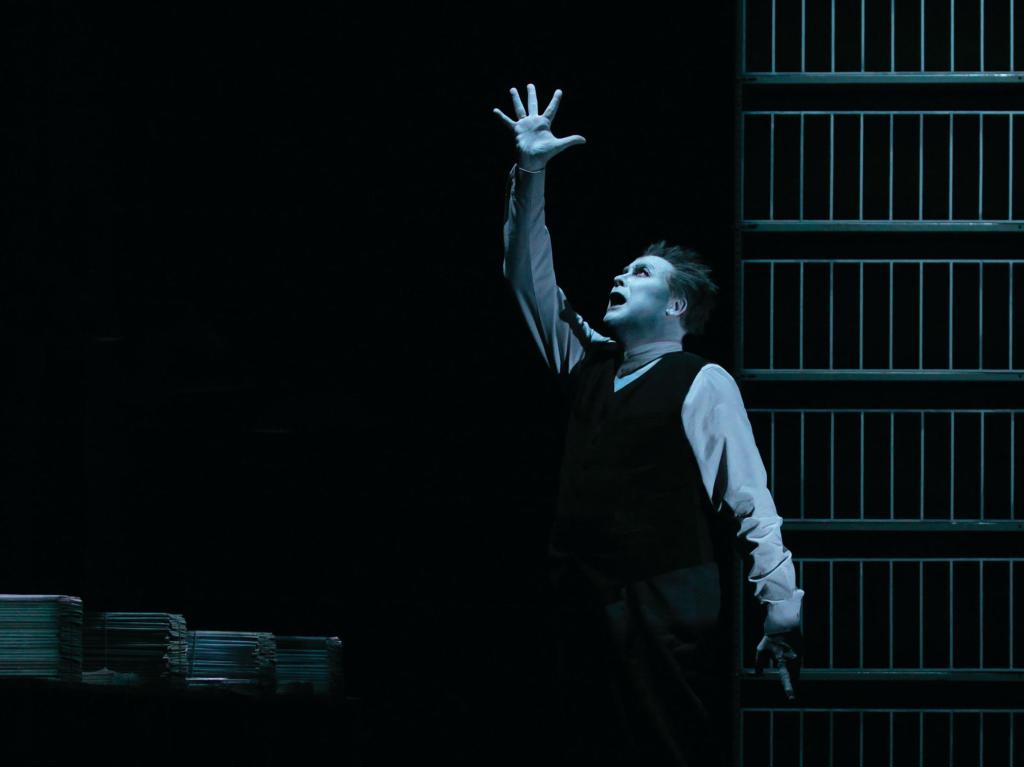Image by Lucie Jansch.
As part of the Perth International Arts Festival, American director, visual artist and performer, Robert Wilson, has brought Samuel Beckett’s Krapp’s Last Tape to stage as a self-directed, self-performed piece. Wilson makes a return visit after the successful staging of The Threepenny Opera by the Berliner Ensemble for the 2013 Festival. The Beckett piece, staged with a concentration on lighting effects and white painted face a la Japanese Kabuki theatre, loses the emphasis on its text and leaves me cold.
Despite many others seeming to enjoy this highly concept-driven piece, where the minimal original Becket text is further eviscerated, we are supposed to guess that this is an old man (he doesn’t act like it) reminiscing about his life. In the first 26 minutes of the performance, before a word is uttered, Krapp responds with pantomime surprise and shock to a storm on the tin roof (with very loud thunderclaps) while eating two bananas in a grotesquely exaggerated mime. This is meant to be humorous, but strikes me as immense over-acting and stylised emotion, perhaps hinting at pathos.
Krapp’s Last Tape premiered in 1958 and concerns a man on the cusp of his 70th birthday, reflecting on his life and lost opportunities. He records his life on tape each birthday, and the play constitutes the scene of an act of recording, which also includes listening back to, and commenting on, previous tapes.
This could be described as pure theatre in that you cannot have had this experience anywhere else – except in the theatre. But there is insufficient emotional connection (to the text and the audience) to sustain it and we lose the layers of memory and self, depicted in the original text. Over-acting tends to distance the person from the emotion being articulated. The decision not to stage this piece realistically means that there will always be an element of caricature, and, for example, the prancing high step dancing that indeed might reflect pain in mourning a lost youth just strikes me as silly and self-indulgent to watch.
There is a piece of text in the last ten minutes that illustrates the contrivance of the Krapp character and his inability to feel the events in his life which may be the underpinning ethos for this whole surreal experience. However, I am so bored and dis-engaged by the over-acting couched as a stylistic formalistic device that, by then, it no longer matters to me.
The black and white lighting effects and the set look stunning, as befits an auteur (and originally an architect) of the New York visual arts world. Piles of well-kept paper indicating the futility of retaining memories over a life time, along with the scratchy tape recording hissing at the passing of time are the highlights of this performance. Perhaps Wilson can benefit from an outside perspective at some point, as this audience member, and the small contingent who walk out, feel completely disconnected by this self-indulgent performance.
The performance began half an hour late, with no announcement from the venue, and the wait was not worth it for Krapp’s Last Tape.
Rating: 1 ½ out of 5 starsKrapp’s Last Tape
Written by Samuel Beckett
Performed by Robert Wilson
Directed by Robert Wilson
Designed by Robert Wilson
His Majesty’s Theatre, Hay St
Perth International Arts Festival
www.perthfestival.com.au
22 – 23 February





